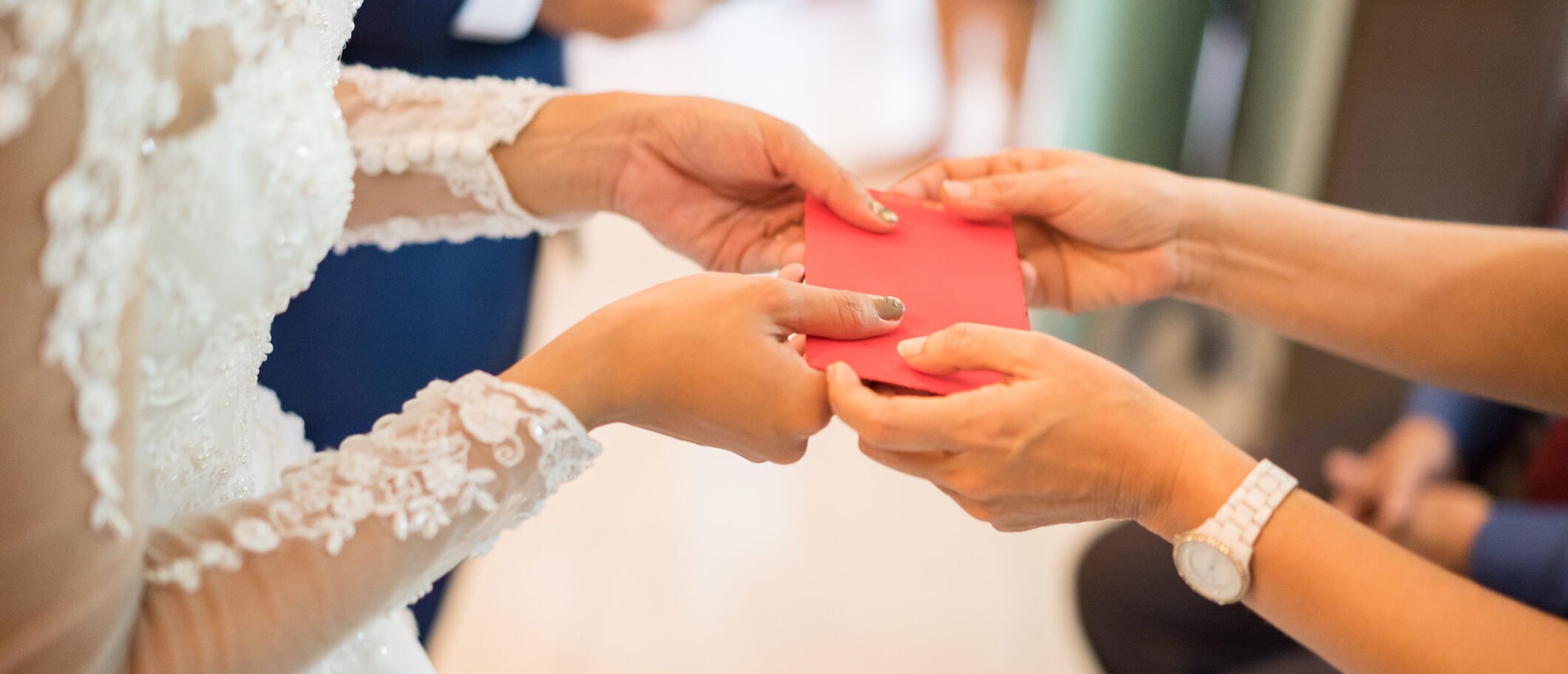While some wedding guests still choose to scan gift registries for the juicer or set of towels that says, “I’m exactly this happy for you,” money has gradually replaced physical goods as the wedding present of choice for many Canadians.
According to Danielle Andrews, president and co-founder of the Wedding Planners Institute of Canada, it’s increasingly rare to see guests bring physical gifts to weddings. Cash, she says, is the more convenient option.
If envelopes outnumber boxes on the wedding reception gift table, you and your new spouse could wind up walking away with your first joint windfall. Deciding what you’ll do with that wedding cash is important.
Not only can your choices fuel progress toward shared goals, they can also help you establish financial habits that will pay their own dividends over time.
How much wedding gift money will you get?
It’s only human to wonder — even if it’s just for a few guilty seconds — just how much cash you may receive for your wedding.
Prevailing etiquette suggests a monetary gift between $100 and $200 per guest, but just because you’re inviting 100 people to your wedding doesn’t mean you’ll be sitting on $15,000 once the confetti has been swept up. With inflation squeezing the juice out of so many bank accounts, this may not be the year to expect generous cash gifts from everyone on your guest list.
There’s also the little matter of paying for your wedding. The cost of the average Canadian wedding in 2019, the last time most of the planet experienced a typical wedding season, was over $29,000, according to The Knot’s 2019 Global Wedding Report.
A bill like that may not leave you with a lot of money to play around with, even if your guests are especially generous.
Bily Xiao, a Vancouver-based financial planner and founder of Mobius Planning, says he and his wife used most of the monetary gifts they received to pay off their 2013 wedding.
“There’s honestly not a lot of surplus left,” for many couples, Xiao says.
But the amount you end up with isn’t as important as what you decide to do with it. Cash really can be the wedding gift that keeps on giving — if you let it.
What to do with wedding gift money
Tackle high-interest debt
Whether it existed before your wedding or was incurred to pay for the event itself, consider using wedding gift money to deal with debt.
Any credit card debt or personal loans taken on to pay for wedding expenses should be paid off first, Xiao says.
Eliminating high-interest debts like these can increase cash flow and establish you as a more creditworthy couple in the eyes of future lenders. Teaming up to strengthen each other’s finances in this way can also help lessen the anxiety some couples may feel when combining their resources for the first time.
Stash it in savings
If your debt load is manageable, put your wedding money toward financial goals that might require several months, or years, to accomplish, like building an emergency fund or buying a house.
An emergency fund
If you haven’t already, use wedding gift money to seed a robust emergency fund. Having three to six months-worth of living expenses set aside can keep a household grounded if a twister of bad news — like job loss or a medical emergency — suddenly ploughs into it.
Not having those funds available could mean a host of new charges on your credit card or line of credit, or the liquidation of investments you’d rather hold onto.
Chris Worby, owner of Worby Wealth Management in Regina, Saskatchewan, didn’t have an emergency fund in place when he and his wife returned from their honeymoon in December of 2003. Then his wife lost her job.
“Our first year of marriage was spent making copper wire out of every penny, just stretching them out,” Worby says, adding that having an emergency fund in place would have not only made things easier financially, but emotionally as well.
“That’s exactly what the emergency fund is for,” Worby says. “The stress reduction of that safety net is just incredible.”
A home of your own
Wedding cash can also kickstart down payment savings for a new home.
Xiao is sympathetic to young couples who feel a need to grow their down payments as quickly as possible, but warns that the state of the global economy makes investing those critically important funds risky. “Markets are volatile,” Xiao says.
Whether you choose to build emergency funds or sock away cash for a down payment, both Worby and Xiao encourage the recently wed to store their money in a high-interest savings account rather than hunting more immediate returns in the stock market.
Invest for the future
It’s never too early to put money away for the long-term, especially when there are two futures to plan for. Depositing some of your wedding cash into a tax-free savings account or registered retirement savings plan is a smart way to start planning for retirement, and beyond.
Both TFSAs and RRSPs allow you to withdraw money before you retire if it’s needed to support your household in other ways, like purchasing a home or educating yourself for a career change.
If investing in the stock market for long-term gains is something you’re eager to do, Xiao suggests proceeding conservatively and considering index funds, especially if you’re a beginner.
However you use wedding cash, do it together
Particularly where long-term strategies like RRSPs and other investments are concerned, Xiao feels couples shouldn’t rush into decisions about how to use wedding cash without first assessing their shared goals and coming up with a holistic financial plan.
“They need to figure out how to balance between their competing priorities before figuring out where to put the money,” he says, adding that a wedding is the perfect opportunity for a couple to have a meaningful conversation about where they want to be financially.
Worby agrees. Being thoughtful about how to use wedding cash is a couple’s first chance to establish good financial habits, he says.
One of those habits is placing needs ahead of desires. While you and your spouse may be tempted to spoil yourselves after all the hard work of planning a wedding, putting that money to work — even if it’s just a few hundred dollars — could be more beneficial than spending it on the items left on your gift registry.
DIVE EVEN DEEPER

Love Isn’t All You Need: How to Disaster-Proof Your Wedding
Unforeseen events before, during and after your wedding can result in huge financial losses (and a lot of stress). But smart planning can keep those risks in check.

How to Manage Your Personal Cash Flow
Cash flow is your income minus expenses over a set period of time, usually a month.

Why Are Emergency Funds Important?
An emergency fund is best kept in an accessible savings account so you can easily get your money when unexpected expenses arise.

Are Micro Weddings Here to Stay? What to Know Before Planning One
Micro weddings — all the rage during COVID’s social distancing restrictions — will likely outlive the pandemic, but not necessarily because they’re cheaper.

